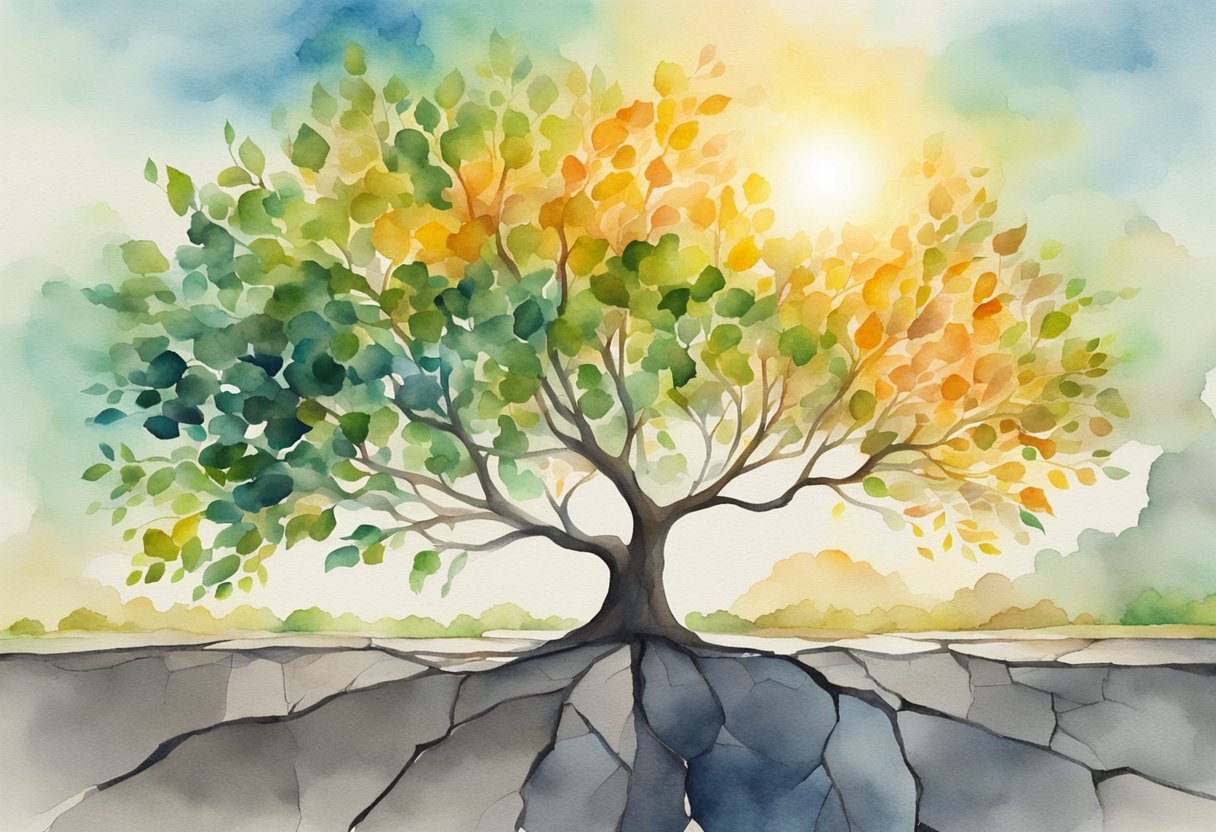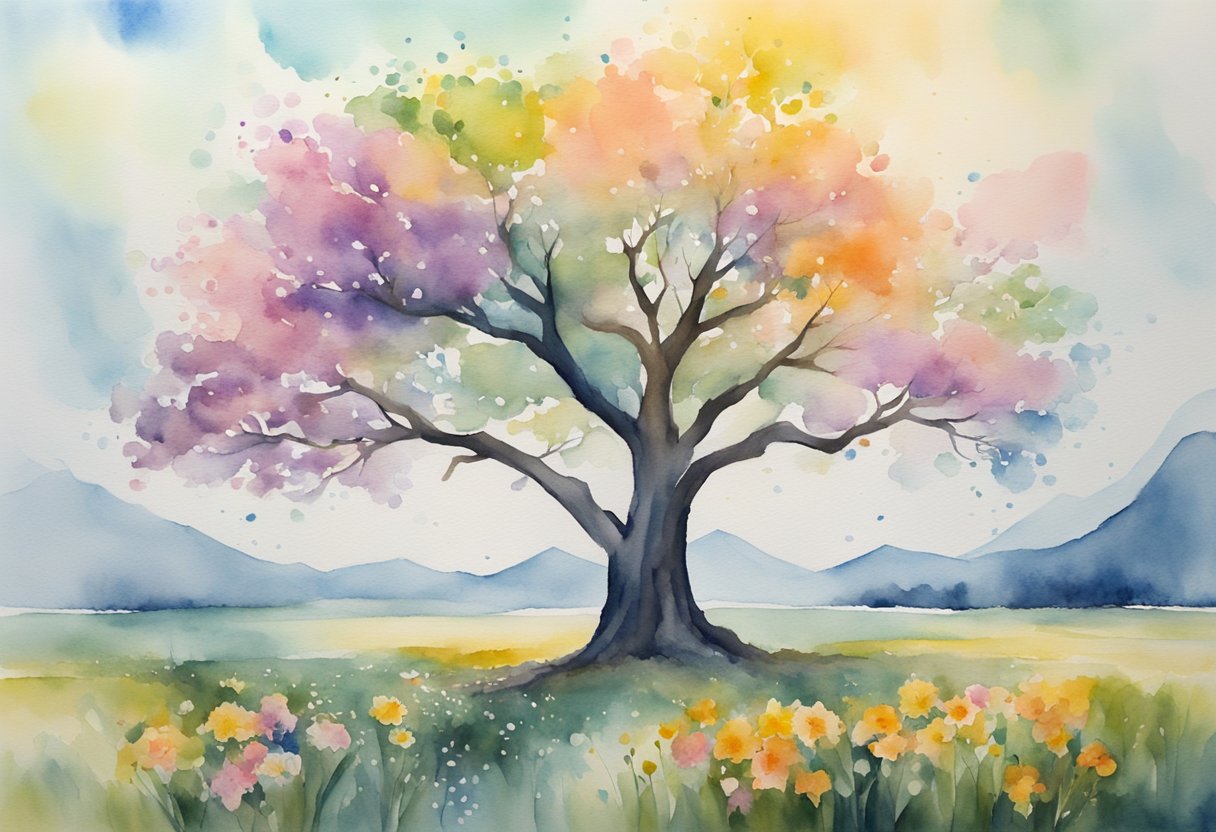Thriving with Mortality and Cancer Resilience

Facing a cancer diagnosis can be a transformative journey that alters every aspect of our lives. It requires us to confront our mortality and reconsider what gives our existence meaning. As survivors, we find ourselves thrust onto a path that demands resilience, courage, and the relentless pursuit of a renewed sense of purpose.
It’s not just about the struggle against the illness; it’s about emerging on the other side with a perspective that enriches our lives and propels us forward.
We move beyond our diagnosis by harnessing our experiences to empower ourselves and others. In doing so, we forge a unique identity defined not by cancer but by the strength we’ve gained and the connections we’ve made. Our search for purpose can lead us to find solace and inspiration in art, nature, and spirituality, each offering a wellspring of comfort and a reminder of life’s beauty despite its challenges.
Our support network becomes a pillar of our journey, offering practical aid and the emotional sustenance needed to navigate survivorship. With knowledge and active participation in our recovery, we cultivate a sense of empowerment, embracing our roles as mentors and advocates within the cancer community. This camaraderie paves the way for a narrative of thriving rather than surviving.
Key Takeaways
- We redefine our sense of purpose to find meaning beyond our cancer experiences.
- Connections with nature, art, spirituality, and community shape survivorship.
- Empowerment emerges from sharing knowledge and supporting fellow survivors.
Understanding Cancer

As survivors, we recognize the significance of comprehending cancer’s complex nature. We’ll explore the biology, diagnosis, and the latest in treatment.
The Biology and Types of Cancer
Cancer arises from our cells that grow uncontrollably, forming a mass known as a tumor. These malignant cells can originate in numerous body parts, with each type presenting its unique challenges. For example, leukemias involve blood-forming tissues and do not form solid tumors. Solid tumors, like those in lung or prostate cancer, can disrupt organ systems and spread or metastasize to other body regions.
Common Types of Cancer among Men:
- Prostate Cancer
- Lung Cancer
- Colorectal Cancer
Diagnosing Cancer: Methods and Challenges
Our journey starts with a diagnosis, often a daunting step. Doctors employ various methods to detect cancer, including imaging tests like MRIs and CT scans, which offer a glimpse inside our bodies. Biopsies provide a concrete diagnosis by examining tissue under a microscope. Blood tests may hint at cancer but can’t always pinpoint the disease’s presence. Each person’s symptoms and lab results guide the diagnostic process, which can sometimes be long and arduous.
Diagnosis Challenges:
- Asymptomatic early stages: Some cancers show no signs until they’ve advanced.
- Non-specific symptoms: Common issues like fatigue can signify cancer or less severe conditions.
Advancements in Oncology and Treatment Options
Strides in oncology give us hope. Customized treatment plans now factor in the type and stage of cancer, with therapies like chemotherapy targeting rapidly dividing cells. Surgery remains a cornerstone for removing tumors, while clinical trials at NCI-designated centers offer cutting-edge options that push the boundaries of science.
Treatment Advances:
- Targeted Therapy: Attacks specific cancer cell mechanisms.
- Immunotherapy: Boosts our immune system to fight cancer.
Our collective experience underscores the need for an arsenal against this illness. We advocate for robust support and the latest knowledge to empower each other in this fight.
Navigating Cancer Survivorship
As we transition from cancer patients to survivors, the path unfolds with unique challenges and careful management of our well-being, requiring vigilant care and understanding of the late effects that may follow treatment.
The Journey from Patient to Survivor
Survivors begin a distinct phase once treatment ends. Trading the frequent visits and active therapy for a quieter yet equally vigilant routine becomes our new reality. We communicate closely with healthcare professionals to catch and address any signs of recurrence early.
Survivorship Care and Long-Term Monitoring
Survivorship care is a crucial step in our journey. It involves regular screenings and tests to ensure our continued health. A personalized care plan tailored to our individual medical history and treatment helps us stay ahead, ensuring that any long-term effects of cancer treatment are managed effectively.
Cognitive and Emotional Changes Post-Cancer
We might find that our mental capacities shift following the treatment. Situations like ‘chemo brain’ can be frustrating, presenting us with difficulties in concentration and memory. Similarly, the emotional rollercoaster post-cancer often entails swings from relief to anxiety. Peer support groups and professional help can play healing roles for us, providing solace and strategies for coping.
Each of these components anchors us, providing stability and support as we redefine our lives post-cancer.
Coping with the Reality of Mortality

When we face the stark reality of mortality after a cancer diagnosis, it’s crucial that we navigate our feelings, seek support, and communicate with loved ones.
Facing Mortality After a Diagnosis
Learning we have cancer can feel like an abrupt collision with our mortality. We might initially respond with disbelief as if our life plans have been instantly derailed. Yet, we find the strength to confront the truth of our situation, often discovering reserves of courage we never knew we had. We learn to pivot from dwelling on our mortality to focusing on living fully in the present.
Acceptance and Reconciliation
Acceptance doesn’t happen overnight. It’s a journey, one that may require us to make peace with our diagnosis. We strive to reconcile with our bodies, knowing we cannot control everything. We celebrate small victories, aware that each day is a gift. Embracing acceptance allows us to focus on what matters most and make meaningful choices that enrich our lives.
Support Systems and Engaging Loved Ones
Our battles are not solitary. We create resilient support systems—care networks with family, friends, and fellow survivors who understand our struggle. We engage our loved ones, sharing openly about our fears and hopes. Through these bonds, we foster a shared strength, finding solace and encouragement in the collective embrace of those who stand by us.
The Role of Art, Nature, and Spirituality

Engaging with art, nature, and spiritual practices can offer profound comfort and a sense of purpose, especially during the arduous illness journey. These outlets provide unique paths to find peace, express emotions, and discover deeper meaning in our existence.
Expressive Therapy through Art
Art offers us a voice when words prove insufficient. Within the stroke of a brush or pencil scribble, we uncover emotions and thoughts that might have eluded us. Studies indicate that art therapy can be a treatment, aiding in our mental and emotional rehabilitation. We can channel our frustrations, fears, and triumphs into creations that provide relief and contribute to personal development.
Finding Solace in Nature
Standing under the vast expanse of the sky or amidst the whispering trees, we feel a connection to something – greater than ourselves. Nature is a refuge where our troubles can seem smaller and more manageable. Time spent in the natural world is associated with improved well-being, as detailed in the MIDUS study, offering us a tranquil setting for reflection and healing.
Spiritual Practices and Well-Being
Our spiritual beliefs and practices—prayer, meditation, or simple contemplation—foster resilience as we face life’s challenges. Spirituality provides a framework to seek ultimate meaning, purpose, and transcendence, shaping our approach to health care and patient support. A strong spiritual foundation has been linked with better health outcomes, emphasizing spirituality’s role in our overall well-being as we navigate our health journeys.
Exploring Identity Beyond Illness

As we grapple with cancer, we realize the journey isn’t just about treatment; it’s a path to redefine our identities and reshape our purposes away from solely being a patient.
Reclaiming Self Beyond the ‘Cancer Patient’ Label
In the aftermath of a diagnosis, we often find ourselves engulfed by the singular identity of a “cancer patient.” But we are so much more. We strive to find and emphasize other aspects of our identity that may have been overshadowed by illness.
For many of us, reclaiming our pre-cancer selves involves diving back into hobbies and interests we cherish. For others, it might be nurturing relationships or professional endeavors that affirm our multiplicity.
The Process of Adjusting and Evolving
Adjusting to life during and after cancer treatment is more than a phase; it’s a continuous evolution. We strive, not without struggle, to integrate the experience into our lives in a way that allows for growth. This might mean setting new, achievable goals that align more closely with our current values and capacities, suggesting a recalibrated sense of normalcy that embraces our history with cancer but isn’t confined by it.
Redefining Life’s Purpose and Aspirations
Our encounters with illness often bring to light what truly matters to us. Whether dedicating time to mentor fellow survivors or channeling our energy into meaningful work, these moments push us to ponder the broader meaning of life.
We learn to craft a narrative for ourselves that looks beyond survival and places us firmly on the path of thriving, where our aspirations are bound not by limitations but by the depth of our passions and the strength of our resolve.
Support Networks and Community Resources
Strength lies in numbers, and for us, the networks and resources available provide a lifeline during our journeys through cancer. These entities’ collective experience, wisdom, and assistance can redefine the cancer journey, making it a path toward growth instead of an isolating battle.
Importance of Social Support Groups
We find solace and understanding within social support groups. These groups offer a space to share experiences, including coping strategies, encouragement, and sometimes the hard truths of living with the condition. Websites serve as platforms to link us with such groups where conversations and personal stories foster a sense of belonging, helping us to see our situation through the lens of community rather than in isolation. Engaging with others facing similar challenges is akin to having a team by your side, ready to pass the ball when needed.
Role of Caregivers and Family
Caregivers and family are the backbone of our day-to-day support. They are the unsung heroes who provide not just physical assistance but also emotional stability. The impact of a caregiver who listens and understands can’t be overstated. Regular family gatherings and one-on-one sessions with friends provide an avenue for releasing tension and fostering bonds that nurture our spirits.
Educational and Community-Based Programs
We are never alone, thanks to educational resources along with community-based programs. They equip us with the knowledge we need to navigate our health effectively. From workshops to seminars, these programs serve as a beacon, guiding us toward informed decisions about our health. Together, we learn the significance of nutrition, exercise, and mental wellness, translating educational content into practical steps toward surviving and thriving.
Empowerment through Knowledge and Participation
Gaining strength from what we endure, we harness knowledge and active involvement to transform our cancer journey into a thriving and influential experience.

Contributing to Research and Systematic Reviews
We can shape the landscape of cancer treatment and care by participating in research initiatives. As survivors and thrivers, our unique perspectives add invaluable data that contribute to systematic reviews, offering a more comprehensive understanding of the complex needs specific to men navigating the aftermath of cancer. Sharing our experiences ensures that research reflects our reality, leading to better-tailored solutions.
Getting Involved in Cancer Advocacy
Our voices are powerful tools for change, especially in advocating for the needs of men facing cancer. Engaging in cancer advocacy groups educates us on policy, creates support networks, and empowers us to influence decisions affecting our care. As advocates, we champion initiatives that improve treatment access, ensuring no one fights alone.
Learning from Survivor and Thriver Narratives
Stories have the power to uplift and educate. Through sharing and listening to survival narratives, we gain empowerment and the ability to face our circumstances with resilience. These stories provide insights and strategies that guide us and our fellow men on how to thrive, not just survive, giving us a playbook of perseverance for life beyond cancer.
Final Thoughts…
In our journey with illness, especially when facing cancer, we find resilience we never knew we had. We grow through these experiences, learning that our spirit can outshine the darkest moments. As thrivers, we’ve navigated the treacherous terrain of treatment and emerged with insights that can guide others.
Empathy is our strongest ally. It allows us to connect, support, and uplift fellow travelers on this path. Together, we harness a collective strength, turning to sports and teamwork as metaphors for our struggle, embracing the camaraderie and support they represent.
Through personal discipline and team strategies, we craft playbooks for facing adversity. Tapping into a sportsman’s focus, we aim for goals beyond survival – we seek a return to vitality and meaning.
- Stay active – exercise sustains the body and elevates the spirit.
- Seek connection – relationships offer comfort and reinforce our will to overcome challenges.
- Share stories – we inspire and offer hope by recounting our trials and victories.
Finding purpose beyond illness infuses our days with grace and dignity. With triumphs, large and small, we redefine victory not just in overcoming cancer but in enriching every aspect of life – and we do this together.
Let us carry these truths, offering a hand to those still navigating their way. Our paths, though fraught with obstacles, can lead us to a place where we don’t just survive but thrive, lending our voices to echo that we are not alone in this fight. -T
Frequently Asked Questions
In facing chronic illness, we discover profound strength and resilience. These FAQs address the mental and emotional strategies for navigating this challenging journey.
How can individuals cope with the psychological impact of chronic illness?
We tackle the psychological toll by embracing support networks and focusing on activities that bring us joy and fulfillment. Professional guidance, like therapy, also provides us with crucial coping mechanisms.
What are the stages of accepting a life-threatening condition?
Initially, we might confront denial, followed by anger. Bargaining often comes next, with depression as a possible stage before ultimately arriving at acceptance. Each journey through these stages is unique to us.
What psychological changes might occur during a serious illness?
We may experience a range of emotions, from anxiety to a renewed sense of purpose. Our outlook on life can profoundly shift, sharpening our focus on what brings us delight and connection.
What are some effective strategies for managing mental and emotional health during incurable disease?
We find strength through activities that keep us engaged, like meditation or gentle sports. Staying connected with loved ones and being part of community groups offer us emotional solace and practical support.
What is psychoneuroimmunology, and how does it relate to cancer patients?
Psychoneuroimmunology explores how our emotions and neural responses affect our immune system. For us, understanding this connection offers insights into how stress reduction can support our cancer battle.
How do people redefine their sense of purpose after a cancer diagnosis?
After cancer touches our lives, we often seek what resonates deeply with us, be it advocacy, mentoring others, or pursuing passions we’ve sidelined. We construct a sense of purpose that reflects our current realities and the futures we envision.
